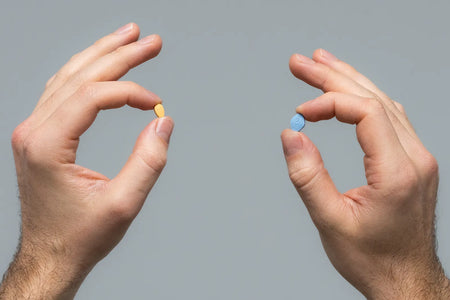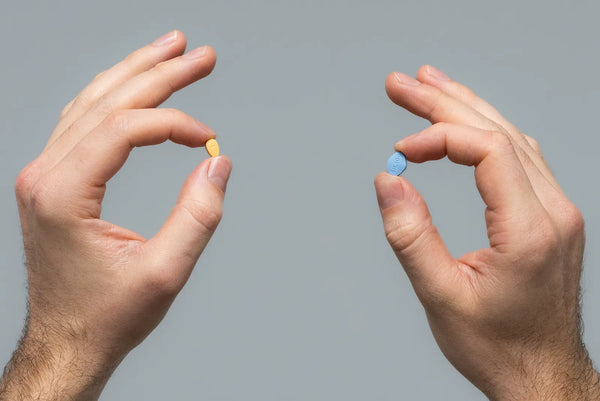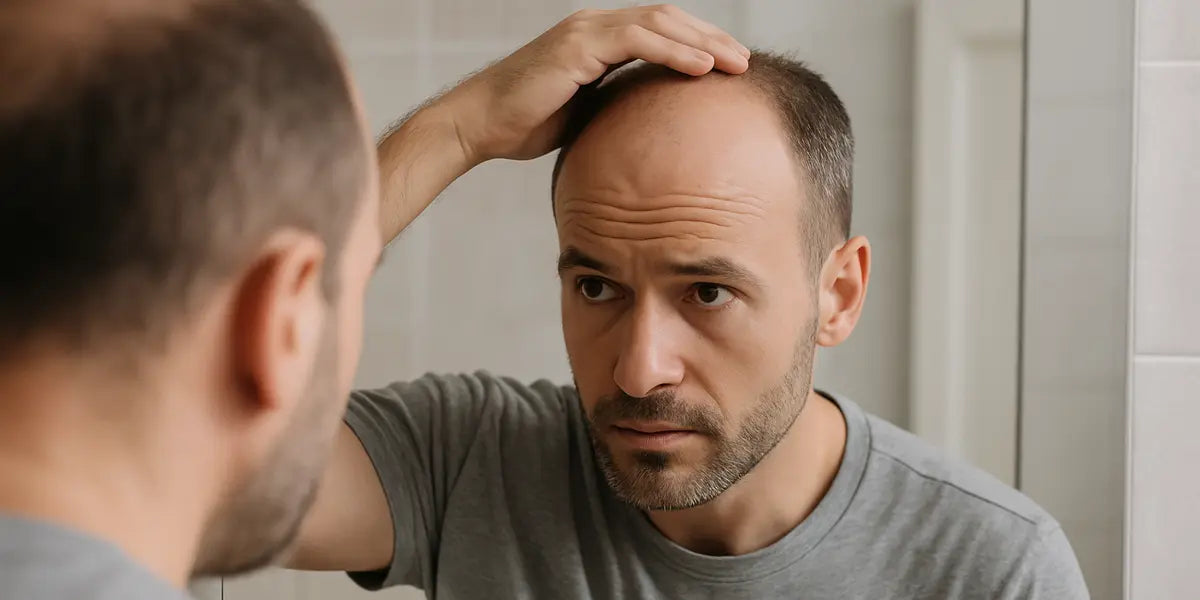Men’s Sexual Health Matters
Sexual health is not just about performance in the bedroom. It is critical to our physical and mental well-being. Yet for many men and for various reasons, sexual performance or rather struggles with sexual performance, remains a topic often hiding in the shadows.
With new platforms for discreet medical assessments, such as XYON Health, and with numerous treatment strategies now available for improving sexual health, now more than ever, men can take control over their sexual health and in a manner that suits them.
Whether you're trying to treat conditions like erectile dysfunction or low libido, or simply looking at ways to improve intimacy, this article written by Dr. Simon Pimstone MD, PhD, FRCPC (UBC Division of General Internal Medicine), an expert in men’s health and disease prevention, provides medically sound insights as well as strategies you can use to improve your sexual health and wellbeing.


If You're Experiencing Erectile Dysfunction, Our Medications Can Help
Get the more affordable and equally effective versions of Viagra and Cialis, delivered to your door
What Is Sexual Health?
Sexual health doesn’t mean just good sexual performance and the absence of sexual dysfunction or disease. It also refers to the mental, physical and social benefits of good sexual function. Good sexual health provides better feelings of well-being, confidence and happiness and an improved level of intimacy with your partner.
Is Good Sexual Health Good For You?
The short answer is yes, maintaining good sexual health is not only a sign of a healthy body and mind, but conversely, good sexual health is also key to maintaining overall health [1]. Sexual health problems such as erectile dysfunction (ED) or low libido, have been shown to have a significant negative impact on relationships with sexual quality being directly correlated with quality of life.
Is Sexual Intercourse Good for Health?
Sex is great for men's health on many levels.
- Stamina: Sex builds stamina. Stamina lowers risks of diseases such as cardiovascular disease, diabetes, high blood pressure and obesity. Sexual activity is estimated to generate up to 5.8 metabolic equivalents (or METS) and burn approximately 85kcal, about the same energy requirement when taking a brisk walk [2]. Naturally, more frequent and longer durations of sexual activity might offer greater stamina benefit over less frequent sexual encounters. Sexual activity can also pose risks for certain people, for example those who have had a recent heart attack. Always consult with your doctor if you are uncertain about what level of sexual activity is right for you if you do happen to suffer from cardiovascular disease.
- Core muscle strength: Sexual activity engages core muscle groups and can help maintain core strength.
- Mental well-being: Sexual activity reduces key proteins like adrenalin and cortisol, proteins that can cause negative physical effects, and at the same time, sex releases important “love hormones” including oxytocin and endorphins which are known to create calm and lower stress. Satisfying sexual activity is also known promote better sleep [3].
- Prostate Health: A little-known fact: Studies have shown that frequent ejaculation may lower the risk of prostate cancer [4]. In one important study looking at this, men aged 40-49 years who ejaculated more than 21 times each month had a 22% significant relative risk reduction in incidence of prostate cancer vs men in that same age category who ejaculated less than 7 times each month. This does not mean regular intercourse or masturbation eliminates the risk of prostate cancer, but it is thought that is regular ejaculation, might flush out toxins, carcinogens or may reduce calcification buildup.
Regular sexual intercourse heavily encouraged from a medical perspective.
Does Sexual activity Before Exercise Improve Performance ?
Sexual activity is often prohibited for athletes participating in elite athletics competitions such as the Olympics, or the World Cup of Soccer. This is likely related to the energy expenditure and the mental distraction. However, often athletes ask the opposite question: might sexual activity before exercise in fact help boost athletic performance because of increased production of testosterone short term?
The short answer is no. In fact, this has been studied. In an excellent analysis published in 2022 [5] the authors showed that sexual activity within 24 hours of exercise had no impact in improving physical performance including endurance, strength or aerobic fitness.
Common Sexual Health Issues Men Face
There are four key sexual health concerns that men commonly experience:
- Erectile Dysfunction (ED): Often linked to diseases such as cardiovascular disease, diabetes, high blood pressure, obesity and also commonly associated with stress, anxiety, depression or poor sleep.
- Low Libido: Can stem from medical causes such as low testosterone, low thyroid, neurologic conditions but can also occur from mental stresses including poor sleep, anxiety, depression or medications.
- Premature Ejaculation (PE): Affects up to 1 in 3 men, particularly at a younger age, and is often treatable.
- Infertility: Declining sperm quality is influenced by numerous lifestyle and environmental factors. Stress, poor sleep, medications and environmental toxins might all affect sperm quality.
Together, these sexual health issues can result from but also lead to, significant health challenges. Sexual performance is key to maintaining a healthy mind and body as well as in supporting relationship health, trust and intimacy.
How to Improve Sexual Health Naturally
We often get asked by patients and our customers, how they can improve sexual function naturally. Remember, that anything that offers a “natural cure” or sounds “too good to be true”, probably isn’t a cure and isn’t true. But there are some important practices that have indeed been studied and which show numerous benefits in terms of maintain good sexual performance and health.
1. Eat Well
Your diet is the platform on which your sexual health is built. There is good evidence that weight loss and certain diets such as the Mediterranean Diet, not only lower the risk of diseases such as cardiovascular disease or diabetes but can improve sexual function and even improve symptoms such as ED [6]. Western diets that are higher in processed foods, are even linked with reduced semen quality [7].
- Spinach & Avocados: Rich in folate and healthy fats, they improve blood flow and hormone balance.
- Whole Grains & Lean Proteins: Support energy and help build lean muscle mass.
- Fatty fish: Salmon and sardines are very high in omega-3 fatty acids which improve vascular function.
- Dark chocolate: Contain flavonoids which improve blood flow by increasing nitric oxide production.
- Limit Sugar & Processed Foods: These can add to weight gain, disrupt hormone levels and reduce numerous elements of sexual function such as libido.
2. Move more
Exercise isn’t just good for your cardiovascular health and your aesthetic; it’s a natural libido booster.
- Cardio and aerobic exercise: Enhances circulation (blood flow) and improves sexual stamina.
- Strength Training: Increases testosterone and confidence. Contributes to a better self image and improves libido.
- Yoga & Stretching: Reduce mental stress and anxiety and improves flexibility.
Aim for at least 30-40 minutes of moderate to vigorous intensity exercise as well as weight training at least 4 days a week.
Interestingly, and importantly, overtraining, both in terms of exercise duration and intensity, can have the opposite effect, lowering libido and contributing to ED [8].
3. Sleep Enough
Sleep is when your body restores hormonal balance and you switch from a heightened sympathetic state (when your body is in overdrive) to a parasympathetic state, where your body calms and all it’s functions rest.
- 7–9 hours per night is considered ideal, although each person has their own sleep “sweet spot”.
- Chronic poor sleep lowers testosterone and contributes to ED and poor libido
- Create a sleep-friendly environment at night: a cool, dark room is ideal, free from tech and noise. Disconnect completely from electronic distractions such as your phone or laptop.
4. Stress Less
Stress can be a major libido killer and different stress levels can affect different people in different ways.
- Meditation & Mindfulness: Practicing meditation and paying attention to your mental health lowers cortisol levels and creates greater sense of calm. You can think more clearly and enjoy pleasures more when you’re calm.
- Breathing Exercises: These are ideal for calming your nervous system.
- Nature therapy: Sunlight boosts elevating vitamin D levels and improving mood. Try do your exercise outdoors when you can.
5. Cut the Vices
Smoking, drug use and excessive and chronic alcohol consumption are major contributors to sexual dysfunction [9].
- Smoking: Damages blood vessels, reducing erection quality.
- Drugs: Create negative body image and quality of sexual relationships.
- Alcohol: Impairs nerve function and hormone balance. It also impairs frontal lobe function and therefore can have a significant effect on decision making, which is key to good sexual function within a relationship.
Cutting back on smoking and alcohol consumption can lead to noticeable improvements in sexual performance and libido.
6. Stay Well Hydrated
Water is essential for energy, circulation, and stamina.
Dehydration can lead to fatigue and reduced libido, particularly, when it is chronic.
Aim for 1-2 L of water daily, depending on activity level and especially in the heat. Keep a water bottle with you and drink when you feel thirsty.
7. Maintain a Healthy Body Weight
Being overweight can lead to numerous health consequences. Not only can it contribute to your risk of heart and brain disease, but excessive weight also results in hormonal imbalances impacting erectile function and sexual desire (libido).
- Fat cells convert testosterone into estrogen, counterbalancing a man's testosterone levels and thereby, lowering libido.
- A good diet, high in fruits, nuts, vegetables, lean meats and plant proteins, and low in saturated fats and processed foods, as well as regular exercise, helps maintain optimal weight and as a result also maintains good testosterone levels.
8. Consider Herbal Options
While good clinical data is not abundant, natural supplements are sometimes used to support sexual health. The following are some examples of natural herbs that are thought to have an effect on improving nitric oxide and blood flow or in boosting testosterone production.
- Ginseng, Maca Root, Gingko Biloba, Tribulus Terrestris
However, be aware of advertisers of “Natural Viagra”. No natural product has been shown to have the same effects on improving penile blood flow as PDE5 inhibitors such as sildenafil or tadalafil. And to my knowledge, no natural remedy can provide meaningful testosterone boosting, particularly important in setting of low testosterone production.
9. Porn
The accessibility of pornographic material online is becoming a major factor in declining men’s sexual health [10]. Particularly for younger men under 40 years of age. ED is being seen more frequently in men under the age of 40. This is not a normal occurrence. With over 70% of men reported to access pornographic material on a regular basis, this habit, while potentially providing short term pleasure, is creating major impacts on key elements of healthy sexual function. Regular porn viewing impacts body image, contributes to feelings of inadequacy, alters arousal reference and has been shown to have a meaningful negative impact on relationships.
10. Visit Your Doctor
Don’t wait for problems to begin or get worse.
- Get screened according to guidelines in your country or state/province, for common disease such as diabetes and heart disease, and get your testosterone level checked if your doctor feels it is indicated. Getting testosterone checked requires a protocol including a morning level (generally between 8 and 10am) with no strenuous exercise or sexual activity for 48 hours before the test.
- Address mental health concerns like anxiety or depression. Your doctor can help you find the right approach naturally and with medications if needed.
- Prostate health becomes increasingly important with age. Get your PSA checked according to the guidelines in your country, state or province. Your doctor can guide you.
Age and Sexual Health
Is it normal to lose my sex drive as you get older and how do I maintain sexual health as I age ?
This is a very common question I hear often. As we age, many men will experience a decline in the male sex hormone, testosterone. This phenomenon is known as andropause and is effectively the male equivalent of menopause, where women lose their normal estrogen production capacity and often require hormone replacement.
Low testosterone is usually caused by loss of normal testosterone production in the testes for two reasons: firstly, the hormones that trigger the production of testosterone, that are normally released from the brain (the hypothalamus and pituitary glands) decline with age. Secondly, the cells in the testes (Leydig cells) that respond to these brain hormones by stimulating testosterone production, become less sensitive to these hormones as we age.
With this age-related loss in circulating testosterone, many men will notice a constellation of symptoms, none of which on their own allows the diagnosis of andropause, but when experienced in an aging male in their 40s or older, should trigger blood tests to measure testosterone levels. Such symptoms include fatigue, loss of muscle and strength, memory deficits and in many cases, a loss of libido. This can be quite extreme, and I have seen men in my practice that have completely lost their sexual desire.
Importantly, this is very often treatable. What’s most important, is that men who have symptoms which could suggest andropause and low testosterone, get seen by a qualified medical specialist who can run the appropriate tests and offer the right treatment.
Treatment of low testosterone includes important lifestyle measures including regular exercise, a good diet, maintaining a good weight, limiting alcohol, removing nicotine and drugs, sufficient sleep and management of mental health. But in some cases, this might not be sufficient. For many men, testosterone replacement overseen by a qualified physician might be required. Men deficient in testosterone might require administration of testosterone. This is generally with a topical gel applied daily, injected into the muscle on a regular weekly or biweekly basis or sometimes via a depot capsule that is implanted just under the skin.
When to see a doctor for sexual health concerns?
Do I need to see a doctor for my low libido or for my ED?
As a doctor and as an aging man, I strongly recommend that you see a doctor if you have any symptoms like ED or low libido for two important reasons:
1. You need to know the cause as some causes of ED and low libido might be serious underlying medical issues such as diabetes, vascular disease or even pituitary brain lesions.
2. Many cases of ED and low libido are treatable. Depending on the underlying cause, treatments might be as simple as managing lifestyle with improved diet and exercise and finding ways to manage stress and anxiety better, including getting better sleep. In some cases, medications are needed and can make a major difference to how you feel. ED can often be treated with PDE5 inhibitor medications such as sildenafil (Viagra), tadalafil (Cialis), vardenafil (Levitra) and avanafil (Stendra). One might need intra-cavernosal injections (such as bimix or trimix). For low libido, testosterone might be required. Any of these medications needs careful medical supervision as there are important considerations such as dose needed, frequency of dosing, drug interactions and importantly, baseline and ongoing observations for potential side effects of any of these medications.
Final Thoughts
Men’s sexual health should not be hidden - it’s key to your general well-being. It should be an important part of your health maintenance. For sexual health problems, major gains can be made with the right medical approach.
If you're ready to take the next step please talk to one of our healthcare providers at XYON to explore therapies. Sexual health isn’t just about performance, it’s about your confidence and quality of life, and addressing sexual function can have positive impacts in many other areas of a man's life.
[1] Vasconcelos P, Carrito ML, Quinta-Gomes AL, Patrão AL, Nóbrega CA, Costa PA, Nobre PJ. Associations between sexual health and well-being: a systematic review. Bull World Health Organ. 2024 Dec 1;102(12):873-887D. doi:10.2471/BLT.24.291565
[2] Frappier J, Toupin I, Levy JJ, Aubertin-Leheudre M, Karelis AD. Energy expenditure during sexual activity in young healthy couples. PLoS One. 2013 Oct 24;8(10). doi:10.1371/journal.pone.0078782 (Assumed / typical PLoS One DOI format)
[3] Liu H, Waite LJ, Shen S, Wang DH. Is Sex Good for Your Health? A National Study on Partnered Sexuality and Cardiovascular Risk among Older Men and Women. J Health Soc Behav. 2016 Sep;57(3):276-96. doi:10.1177/0022146516661597 (inferred DOI format)
[4] Rider JR, Wilson KM, Sinnott JA, Kelly RS, Mucci LA, Giovannucci EL. Ejaculation Frequency and Risk of Prostate Cancer: Updated Results with an Additional Decade of Follow-up. Eur Urol. 2016 Dec;70(6):974-982. doi:10.1016/j.eururo.2016.07.042
[5] Zavorsky GS, Brooks RA. The influence of sexual activity on athletic performance: a systematic review and meta-analyses. Sci Rep. 2022;12:15609. doi:10.1038/s41598-022-20035-9
[6] La J, Roberts NH, Yafi FA. Diet and Men's Sexual Health. Sexual Medicine Reviews. 2018;6(1):54-68. doi:10.1016/j.sxmr.2017.08.003 (typical format for review article DOI)
[7] Danielewicz A, Przybyłowicz KE, Przybyłowicz M. Dietary Patterns and Poor Semen Quality Risk in Men: A Cross-Sectional Study. Nutrients. 2018 Aug 24;10(9):1162. doi:10.3390/nu10091162
[8] Hackney AC, Lane AR, Register-Mihalik J, O’Leary CB. Endurance Exercise Training and Male Sexual Libido. Med Sci Sports Exerc. 2017 Jul;49(7):1383-1388. doi:10.1249/MSS.0000000000001221 (inferred format)
[9] Smith SJ, Lopresti AL, Fairchild TJ. The effects of alcohol on testosterone synthesis in men: a review. Expert Rev Endocrinol Metab. 2023 Mar;18(2):155-166. doi:10.1080/17446651.2023.2173634 (inferred)
[10] Kirby M. Pornography and its impact on the sexual health of men. Trends Urology & Men Health. 2021;12:6-10. doi:10.1002/tre.791




